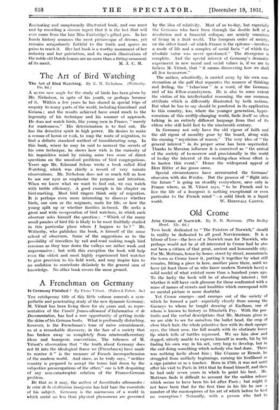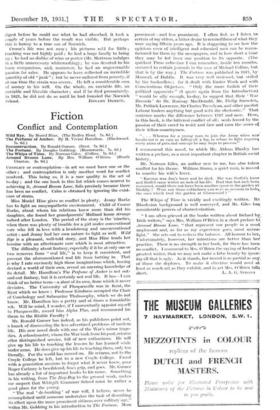Old Crome
Tins book, dedicated to "The Painters of Norwich," should in reality be dedicated to all good Norvicensians: It is a labour of love—the love of a Norwich man for Norwich, who perhaps would not be at all interested in Crome had he also not been a citizen of that great, ancient and honourable city. For Mr. Mottram, house by house, street by street, reconstructs the town as Crome knew it, putting it together by what still remains, fitting a piece in here, another piece there, until we have (at least those of us who know modern Norwich have) a solid model of what existed more than a hundred years ago. To the lucky the book will be of absorbing interest ; but whether it will have such glamour for those confronted with a mass of names of streets and localities which correspond with no mental picture is more doubtful.
Yet Crome emerges—and emerges out of the society of which he formed a part—especially clearly from among the Gurneys to whom he taught drawing at Earlham, one of whom is known to history as Elizabeth Fry. With the por- traits and the verbal descriptions that Mr. Mottram 'gives us we are able to see for ourselves the bullet head, the crop of close black hair, the whole primitive face with its dark opaque eyes, the blunt nose, the full mouth with its obstinate lower lip which tells of battles repressed. 'We see him slow and dogged, utterly unable to express himself in words, bit by bit finding his own way in his art, very long to develop, but in the end doing something which nobody else had done. There was nothing facile about him ; like Cizanne or Renoir, he struggled from unlikely beginnings, earning his livelihood as a sign painter or as a teacher. Born in 1709, it was not until after his visit to Paris in 1814 that he found himself, and then he had only seven years in which to paint his best. Mr. Mottram finds it difficult to account for the sudden release which seems to have been his lot after Paris ; but might it not have been that for the first time in his life he saw a number of the masterpieces of his art of which before he had no conception ? Naturally, with a person who had to
digest before he could use what he had absorbed, it took a couple of years before the result was visible. But perhaps this is heresy to a true son of Norwich.
Crome's life was not easy ; his pictures sold for little ; teaching was not highly paid ; he had a large family to bring up ; he had no dislike of wine or porter (Mr. Mottram indulges in a little unnecessary whitewashing) ; he was devoted to his boon companions, and, moreover, he had an ungovernable passion for sales. He appears to have collected an incredible quantity of old "junk" ; but he never suffered from poverty, if at one time the strain was severe. He left a considerable sum of money in his will. On the whole, an enviable life, an enviable and likeable character ; and if he died prematurely. in 1821, he did not do so until he had founded the Norwich



































 Previous page
Previous page